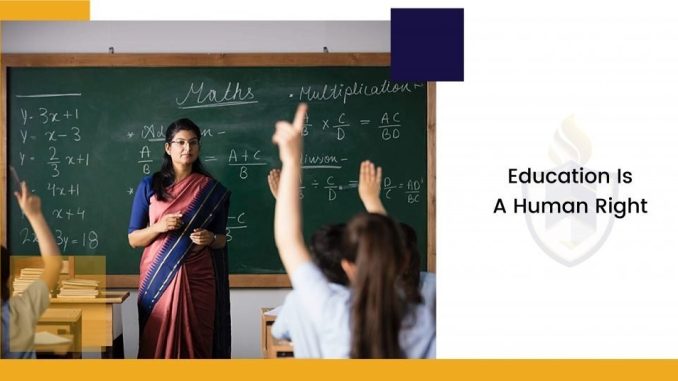
Education is often described as a fundamental pillar of society, a key that unlocks doors to opportunity, innovation, and progress. Yet, beyond its practical benefits, education stands as a profound human right—one that transcends geography, culture, and economic status. Understanding why education is a human right requires us to look beyond the classroom and recognize its role in shaping lives, societies, and the future of humanity. It is not simply a privilege granted to a few, but a universal entitlement that empowers individuals and strengthens communities in ways that no other right can quite match.
At its core, the idea of education as a human right is rooted in the recognition of human dignity. Every person, regardless of background, deserves the chance to develop their potential and participate fully in society. Education equips individuals with the knowledge, skills, and critical thinking abilities necessary to navigate life’s complexities. Without it, people are often confined to cycles of poverty and marginalization, unable to influence decisions that affect their lives. This limitation is not just a personal loss—it stifles the collective progress of communities and nations. By affirming education as a human right, societies commit to ensuring that everyone, without discrimination, has access to this essential foundation.
The Universal Declaration of Human Rights, adopted by the United Nations in 1948, explicitly states that “everyone has the right to education.” This declaration reflects a global consensus that education is not merely a service but a right tied closely to freedom and equality. Access to education empowers people to claim other rights and participate meaningfully in democratic processes. For example, literate and educated citizens are more likely to engage in voting, hold governments accountable, and advocate for social justice. Education becomes a catalyst for inclusive growth, promoting social cohesion and reducing inequalities that might otherwise lead to unrest or disenfranchisement.
Yet, the human right to education is about more than just access. It encompasses the quality and relevance of education, ensuring that learning is meaningful, inclusive, and responsive to individual and societal needs. When education is reduced to rote memorization or limited by resources, it fails to fulfill its promise as a liberating force. Consider the difference between a child attending a school with well-trained teachers, up-to-date materials, and a curriculum that encourages creativity and critical inquiry, versus one stuck in overcrowded classrooms with outdated textbooks. The former experience represents the full realization of the right to education, one that prepares learners not just for jobs, but for thoughtful citizenship and lifelong growth.
Another crucial aspect is that education supports economic empowerment, a factor that cannot be understated. In today’s rapidly evolving global economy, skills and knowledge are vital assets. Education opens doors to employment, entrepreneurship, and innovation, enabling individuals to contribute productively to their communities and economies. When education is denied or compromised, it perpetuates cycles of poverty and limits economic mobility. Countries that invest in equitable education systems tend to enjoy stronger economic growth and resilience, demonstrating that the human right to education benefits not just individuals but entire societies.
Moreover, education fosters social change by challenging stereotypes and breaking down barriers. It plays a critical role in promoting gender equality, reducing discrimination, and encouraging respect for diversity. For instance, when girls have equal access to education, studies show they are more likely to delay marriage, have healthier families, and participate actively in the workforce. These outcomes ripple outward, creating more stable and prosperous communities. In this way, education acts as a bridge to a fairer society where rights and opportunities are more evenly distributed.
The global commitment to education as a human right is reflected in initiatives like the United Nations’ Sustainable Development Goals, which include ensuring inclusive and equitable quality education for all. Yet, despite these efforts, millions of children and adults remain without access to basic education, often due to poverty, conflict, or discrimination. This reality underscores the ongoing challenge faced by governments, organizations, and societies in translating the right to education from principle to practice. Addressing these barriers requires coordinated action, investment, and a deep understanding of the local contexts that influence educational access and quality.
In practical terms, affirming education as a human right demands policies that remove obstacles and foster environments where learning can thrive. This includes investing in infrastructure, training teachers, providing learning materials, and supporting marginalized groups. It also means embracing technology and innovative approaches that can expand access and personalize learning experiences. For example, digital platforms have the potential to reach remote or underserved populations, offering flexible and affordable pathways to education that were previously unimaginable.
Ultimately, recognizing education as a human right is a commitment to the future—one that values the potential of every individual and the collective strength of society. It reflects a belief that knowledge, understanding, and opportunity should not be confined by circumstance or social standing. When education is truly accessible and empowering, it transforms lives, fuels innovation, and builds more just and equitable societies. In this light, education is not just a human right in theory but a powerful engine for human flourishing and social progress.
As we reflect on why education is a human right, it becomes clear that its importance goes beyond policy or economics. It touches the very essence of what it means to be human: to learn, to grow, and to participate in shaping the world around us. Upholding this right is a responsibility shared by all, requiring vigilance, compassion, and action. When we invest in education for all, we invest in a future where dignity, opportunity, and justice are truly within everyone’s reach.
Leave a Reply